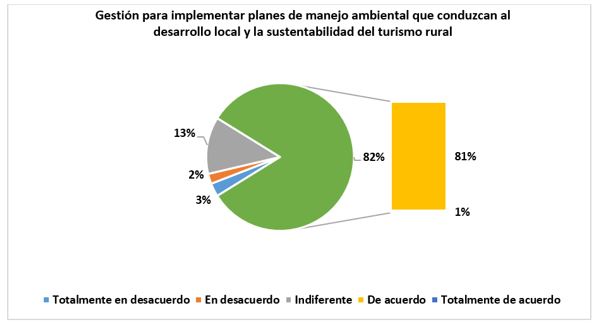Environmental management from the perspective of strategic planning focused on rural tourism in Jipijapa Ecuador
Main Article Content
Abstract
Progress, the advanced stage of the crisis or the remodeling of the agricultural industry are determining factors in the alignment of the dominant rural tourism product in a given region. For this reason, the present work has the objective of evaluating the strategic planning that is carried out to contribute to environmental management focused on rural tourism in the Jipijapa canton, Manabí province, Ecuador. For this, a situational analysis was carried out taking into account the process of planning and monitoring of environmental policies, in order to obtain sustainable rural tourism for local development, in addition, resources with natural and cultural tourism potential were identified. A survey was applied to a representative sample of 136 representatives of rural tourism enterprises in the canton of Jipijapa, to clarify the successes and failures regarding the management of strategic planning to establish environmental management models focused on rural tourism. The results obtained show that rural tourism in Ecuador has significant importance because it contributes to the economic development of the country, considering two basic macroeconomic indicators, the Gross Domestic Product and the generation of employment. Emphasis is placed on the development of a comprehensive environmental management plan, to apply and introduce management measures for solid waste, water, atmospheric emissions, noise and wastewater in rural tourism.
Article Details

This work is licensed under a Creative Commons Attribution-NonCommercial 4.0 International License.
References
Buckley, R. (2011). Tourism and environment. Annual review of environment and resources, 36, 397-416.
Cabrera, R. (2019). Economía del Turismo, obtenido de: https://cupe.com/blog/economia-del-turismo/htlm
Chiavenato, I. (2006). Administración en los Nuevos Tiempos. Bogotá: McGraw Hill.
Cooper, C., Fletcher, J., Fyall, A., Gilbert, D., & Wanhill, S. (2007). El turismo: Teoría y práctica. Madrid: Editorial Síntesis.
Dwyer, L. y Foryth, P. (ed.) (2006): International Handbook on the Economics of Tourism, Edward Elgar Publishing Ltd.
Funes L, Romero I. (2015). Análisis del desarrollo sostenible del turismo en el ecuador desde la perspectiva de la economía, revista delos: desarrollo local sostenible, 24 octubre 2015. En linea: http://www.eumed.net/rev/delos/24/turismo.html
Samaniego, L. A. F., & Lamorú, I. R. (2015). Análisis del desarrollo sostenible del turismo en el Ecuador desde la perspectiva de la economía. Revista DELOS: Desarrollo Local Sostenible, (24).
Herrera, I. M. R., & Fernández, J. I. P. (2010). Factores condicionantes de la sostenibilidad como una dimensión estratégica del desarrollo turístico mexicano. Cuadernos de turismo, (25), 125-146.
Leiper, N. (1979). The framework of tourism: Towards a definition of tourism, tourist, and the tourist industry. Annals of tourism research, 6(4), 390-407.
Lickorish, L. y Jenkins, C. (2000). Una introducción al turismo, Madrid.Editorial Síntesis.
Soto Cardona, O. C., Agudelo, I., & Mejía Argueta, C. (2016). Planeación por escenarios: un caso de estudio en una empresa de consultoría logística en Colombia. ESTUDIOS GERENCIALES, 2. Obtenido de https://pdf.sciencedirectassets.com
Molina, E., Abitia, S. R., Molina, S. S., & Rodríguez, S. (1991). Planificación integral del turismo: un enfoque para Latinoamérica.
O'Leary, J. T., Morrison, A. M., & Alzua, A. (1998). Cultural and heritage tourism: Identifying niches for international travelers. Journal of tourism studies, 9(2), 2-13.
Pigram, J., & Jenkins, J. (1983). Outdoor recreation and the environment. Outdoor Recreation and Resource Management. Croom Helm, London.
Pimentel, M., Guiñan, A., Acosta, Y. (2016). Estrategias de gestión ambiental para impulsar el turismo sostenible como actividad socio-productiva en Playa Sur, Adícora, Estado Falcón, Venezuela Multiciencias, 16(3). 277-287. Tomado de: https://www.redalyc.org/pdf/904/90453464006.pdf, 18 de diciembre de 2021
De Palm, M. P., Medina, A. G., & González, Y. A. (2016). Estrategias de gestión ambiental para impulsar el turismo sostenible como actividad socio-productiva en Playa Sur, Adícora, Estado Falcón, Venezuela. Multiciencias, 16(3), 277-287.
Pin, E. J, Pita, A. E, Santos, V. T. (2018). Aspectos teóricos para la gestión sostenible del turismo rural en la zona Sur de Manabí, Ecuador. RECUS. REVISTA ELECTRÓNICA COOPERACIÓN - UNIVERSIDAD – SOCIEDAD. UTM – ECUADOR ISSN 2528 – 8075.
Figueroa, W. J. P., Lino, A. E. P., & Moreira, V. T. S. (2018). Aspectos teóricos para la gestión sostenible del turismo rural en la zona Sur de Manabí, Ecuador. RECUS: Revista Electrónica Cooperación Universidad Sociedad, 3(1), 27-33.
Rengifo, J. (2013a). Análisis del desarrollo del turismo rural en la provincia de Cáceres en los inicios del siglo XXI. PASOS. Revista de Turismo y Patrimonio Cultural. ISSN 1695-7121 Vol. 11 N. º 4. (pág. 615-630).
Rengifo Gallego, J. I., Sánchez Martín, J. M., & Sánchez Rivero, M. (2013). Análisis del desarrollo del turismo rural en la provincia de Cáceres en los inicios del siglo XXI.
Sharpley, R. (2009). Tourism Development and the Environment: Beyond Sustainability? Earthscan. United Kingdom.
Shaw, G. y Williams, A. (1994). Critical Issues in Tourism. Londres: Blackwell.
Villarino, M. y Cánoves, G. (2000). Turismo rural en Galicia: sin mujeres imposible. En GARCIA RAMON, M.D.; BAYLINA, M. (eds.). El nuevo papel de las mujeres en el desarrollo rural. Vilassar de Mar: Oikos-Tau.
Pérez, M. V., & Valiente, G. C. (2000). Turismo rural en Galicia: sin mujeres imposible. In El nuevo papel de las mujeres en el desarrollo rural (pp. 171-198). Oikos-tau.

